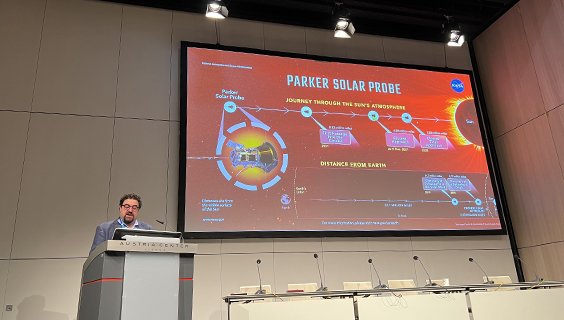
Kasper Accepts the Copernicus Medal in Vienna
After a delay due to the global pandemic, the Copernicus Medal was presented to Professor Justin Kasper during the 2022 EGU General Assembly.

After a delay due to the global pandemic, the Copernicus Medal was presented to Professor Justin Kasper during the 2022 EGU General Assembly.
On May 26, 2022, Professor Justin Kasper, Ph.D., formally accepted the Copernicus Medal 2020 during the General Assembly of the European Geosciences Union (EGU) in Vienna, Austria. The presentation of the medal was delayed due to the global pandemic, and it coincided with the presentation of the 2022 medal.
Kasper was awarded the Copernicus Medal for his pioneering work on the heating and acceleration of the solar corona and the solar wind, and his outstanding leadership of the SWEAP Investigation on Parker Solar Probe, which has now successfully touched the Sun. The presentation of the medal was made by U-M Professor of Engineering Tamas Gombosi, Ph.D.
As a professor in the University of Michigan Department of Climate and Space Sciences and Engineering, Kasper designs sensors for spacecraft that explore extreme environments in space, from the surface of the Sun to the outer edges of the solar system. He is interested in understanding the forces that lead to solar flares and the solar wind, a stream of particles heated to millions of degrees in the Sun’s atmosphere, or corona.
In 2007, he used measurements by the Voyager spacecraft to detect the termination shock, a massive shockwave surrounding our solar system. He has served on advisory committees for NASA, the National Science Foundation, and the National Academy of Sciences. He leads the SWEAP Investigation on Parker Solar Probe, a mission of exploration that made history in 2018 as the first human-made object to plunge into the solar corona. He has also received the Presidential Early Career Award for Scientists and Engineers (2010), the Henry Russel Award (2018), and numerous awards from NASA.